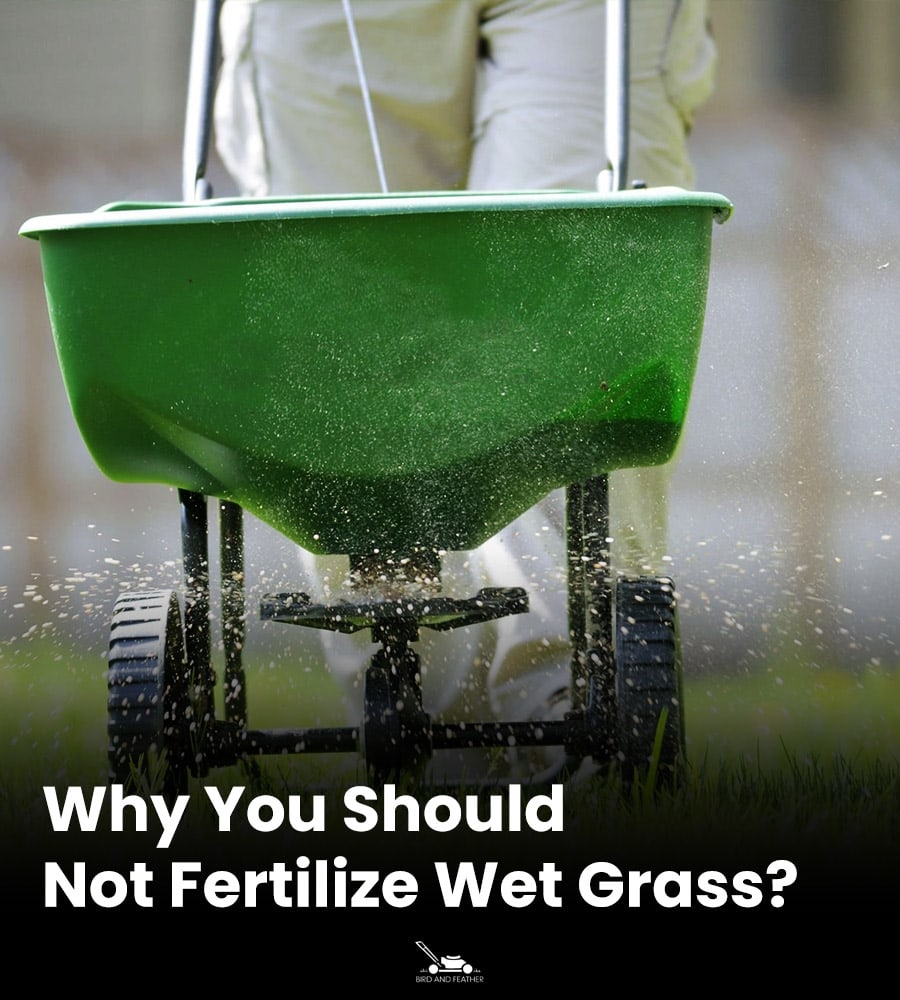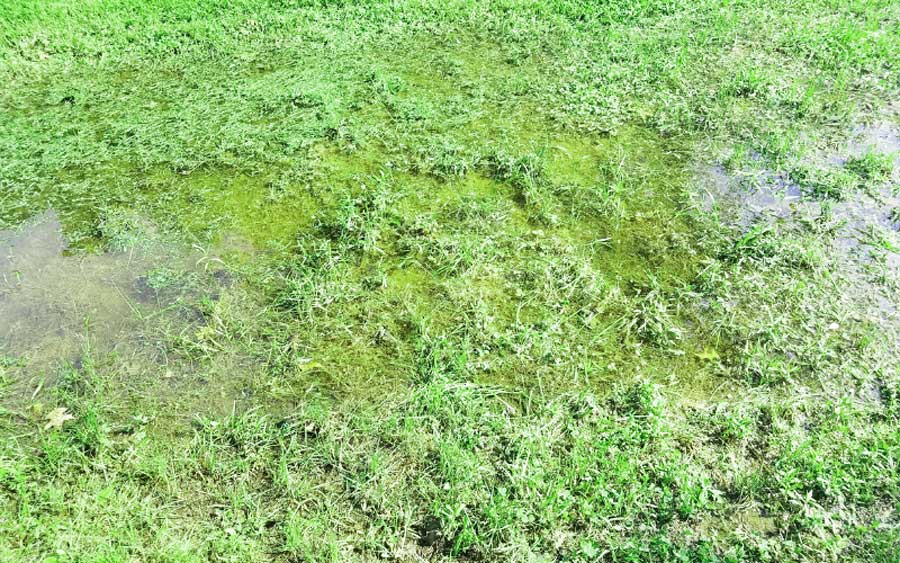What Happens If You Apply Fertilizer To Wet Grass?

Fertilizers are seasonal supplements of healthy grass grown. Fertilizer is applied mostly during spring, summer, and autumn. There comes a rainy season which keeps your turf ( Bahia or St. Ausgustine ) wet and moist almost for an entire week. You must be wondering if I can apply fertilizer to wet grass. This is a debatable topic with many dos and don’ts.
Wet grass can be useful as well as a doom for the usage of fertilizers. Most granular fertilizers require a spray of water for activation and absorption. So wet grass might actually ease this process. But in case you are using liquid fertilizers, then wet grass may wash away the fertilizers.
Heavily flooded or clogged grassland is not ideal for fertilizing as it will only reduce the effectiveness of the fertilizer and dilute it. This article will guide you to use fertilizer on wet grass without any wastage and when not to apply fertilizer on wet grass.
Can You Apply Fertilizer To Wet Grass?
Yes, you can apply fertilizer to wet grass conditionally. Firstly, the grass ( ryegrass or fescue grass ) should just be minimally wet and not submerged in high water levels. Secondly, your choice of fertilizer even matters a lot. Granular or dilutable liquid fertilizers need water for effectiveness and work with wet grass without any issues.
But foliar fertilizers are to be kept away from wet grass. If there are any water-logged areas on the lawn, it’s best to let them drain out before sprinkling fertilizers. As long as you use solid and concentrated fertilizers, wet grass won’t rinse it away, and it will work perfectly fine.
Effect Of Different Fertilizer On Wet Grass


The different fertilizer structures and mediums show different results when applied to wet grass. This is important to understand so that you can use the correct fertilizer and avoid any waste of materials. Let us look at the effect of some common types of fertilizers on wet grass:
1. Liquid Fertilizer
There comes two forms of liquid fertilizer- diluted and concentrated. Dilute liquid fertilizers are already mixed with part water and part chemicals. Applying them on wet grass will further reduce their potency by diluting them more.
So it’s not fit for wet grass. On the other hand, concentrated liquid fertilizers are pure fertilizers with the least water percentage. They need to be diluted before application to avoid grass burnout. Fortunately, you can apply it to wet grass as it will get mixed with water and do its job.
2. Whole-Material Organic Fertilizers
These are natural fertilizers made with organic agents like animal decomposition, worms, plant leftovers, etc. They have natural element proportions. Whole material fertilizers slowly release nutrients into the soil after application.
They can be applied to wet grass as they break down gradually and take time to effect. It can take up to a month to completely incorporate in the soil. You only need to ensure that the lawn is not full of water, just the grass is wet.
3. Granular Fertilizer
These solid fertilizers have a granular structure that can be spread and sprinkled on each corner of the lawn. It is ideal for applying on wet grass. Granular fertilizer needs water irrigation after sprinkling over the grass to start its mixing process.
The water activates the chemicals and releases them into the soil. So, wet grass will aid and fasten this process more effectively. You can face a problem in even the spread of granules in the soil, as they can clump or stick in one place due to water accumulation.
Why You Should Not Fertilize Wet Grass?


Even though wet grass is suitable under some conditions, it’s advised to wait until the water dries out and the grass is dry while applying any fertilizers. If you choose to apply fertilizers on wet grass, these are a few aftermaths you can face:
1. Uneven Distribution of Fertilizers
The wet grass can catch and stick the fertilizer to itself rather than going to the soil. It’s also possible that one side of the lawn passes the nutrients to another due to water. This will lead to uneven growth of grass in the lawn as one part with being undernourished, and another will be overnourished.
2. Loss Of Nutrients
If you apply liquid fertilizers, then chances are water will dilute your fertilizers, and the nutrients will be lost. Water can wash away the liquid and granules of fertilizers, especially if the water is clogged in the grass.
3. Overfeeding of Your Lawn
When you apply fertilizer to wet grass, its ability, and nutrient level decrease due to the high water content in soil and grass. Thus, the first coat is not enough. As a result, you end up putting more coats of fertilizers which overfeeds your lawn.
Overfeeding does more damage than benefit your grass. The excess chemical treatment can burn your grass too, then you have to treat the burnt grass. It’s best to wait and apply one coat enough one time instead of repeating the dose.
Can You Fertilize In The Rain?
Rains show up often during the transitional season of fertilizing. Many people feel confused about whether to apply fertilizers before the rain, during the rain or after the rain. Rains leave your lawns with wet grass. If there is no drainage passage, the lawn can also be swamped with stagnant water.
The application depends on the intensity of the rain. Scanty rainfall doesn’t pose any problem and even helps in the quick absorption of granular fertilizers. But, you must avoid liquid and foliar fertilizers in heavy downpours as they will wash away the fertilizers completely or push them to one portion of the lawn leading to uneven distribution.
Factors That Affect Applying Fertilizer To Wet Grass


Whether or not you should apply fertilizer to wet grass depends on the amount of water level in your lawn.
Scarce Water: Low rainfalls only dampen your soil. It can be easily identified with small dewdrops on the grass blades. This condition is not harmful at all. You can continue to sprinkle your liquid or granular fertilizer normally without insecurity.
Deep Water and Soaked Soil: This happens with relatively more rainfall for about 2 to 3 hours. It forms puddles and muddy grounds. There might be some stagnant water underneath the blades as well.
Allow the water to settle a bit more into the soil. After that, you can sprinkle granular fertilizer over the lawn with little. The rainwater is enough to activate the granules and release nutrients in the soil for fertilization, but you can use a sprinkler if it seems less. Liquid Fertilisers can also be used, but no extra water is needed to be put in.
Flooded Rainwater: This situation is characterized by high water levels and submerged grass blades. Putting any type of fertilizer at this stage is just a waste because it won’t be effective. The water will dilute the nutrients and give the turf the least benefits. It is advised to have patience till the water settles.
When Should I Apply Fertilizer?
You should apply fertilizer when the grass is dry, and the soil is just a tad moist. It also depends on the type of grass- warm season and cool season grass. The peak growing season of every grass is the best time to fertilize the grass so that they absorb and utilize maximum nutrients from the fertilizers. Rainy seasons are unsuitable for fertilizing as wet grass doesn’t hold onto fertilizers.
The Final Thoughts
We have reached the end of the discussion. Our final verdict says that applying fertilizers on wet grass can be tricky. With proper planning and precautions, you can use the rain advantageously. Granular Fertilisers and concentrated liquids are ideal for wet turf and soil.
They need water to come into effect so that water won’t harm their nutrients. We recommend you choose the right fertilizer if you plan to fertilize during rain. At last, just make sure to check your turf condition, growth stage, and type of soil. We wish you a green and healthy lawn.






